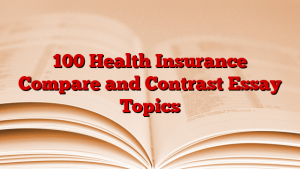List Of 100 Cause and Effect Essay Topics on Medical Insurance
Discover thought-provoking cause and effect essay topics related to medical insurance. Dive into the complexities of healthcare reform, insurance disparities, affordability challenges, and fraud’s impact. Explore the intricate web of medical insurance in our blog.
100 Cause and Effect Essay Topics on Medical Insurance
Are you on the hunt for compelling essay topics that delve into the intricate world of medical insurance? You’re in the right place. In this blog post, we’ll explore thought-provoking cause and effect essay topics related to medical insurance. From the driving forces behind healthcare reform to the consequences of insurance disparities and the shadowy world of fraud, we’ll unravel the complexities of this critical aspect of modern healthcare. So, let’s embark on this journey of exploration and understanding, shedding light on the cause and effect dynamics within the realm of medical insurance.
Causes
of Changes in Medical Insurance:
1. Rising healthcare costs and their impact on insurance premiums.
2. Technological advancements leading to increased medical expenses.
3. Government policies affecting insurance coverage.
4. The influence of pharmaceutical pricing on insurance rates.
5. Changing demographics and their effect on insurance enrollment.
6. Medical malpractice claims driving up insurance costs.
7. Economic recessions impacting access to medical insurance.
8. Employer decisions to alter health insurance benefits.
9. Changes in medical billing practices affecting insurance claims.
10. The role of lifestyle factors in insurance premium fluctuations.
Effects of Medical Insurance Changes:
11. Decreased access to healthcare due to rising insurance premiums.
12. Financial strain on families facing high deductible insurance plans.
13. The impact of insurance coverage on preventive care utilization.
14. Changes in patient-doctor relationships due to insurance constraints.
15. The role of medical bankruptcies in shaping insurance policies.
16. The effect of Medicaid expansion on uninsured rates.
17. Insurance’s influence on healthcare disparities among different populations.
18. The impact of the Affordable Care Act on insurance markets.
19. The role of employer-sponsored insurance in job retention.
20. The consequences of inadequate insurance coverage on health outcomes.
Causes of Health Insurance Disparities:
21. Socioeconomic factors leading to unequal access to insurance.
22. Geographic disparities in insurance availability and affordability.
23. Employment-based insurance disparities based on job type.
24. Racial and ethnic disparities in insurance coverage.
25. Discriminatory practices affecting insurance eligibility.
26. Educational disparities and their link to insurance access.
27. Gender-based disparities in insurance premiums.
28. Marital status and its effect on family insurance coverage.
29. Language barriers affecting insurance enrollment.
30. The role of immigration status in insurance disparities.
Effects of Health Insurance Disparities:
31. Disparities in healthcare outcomes due to insurance inequities.
32. Financial burdens on marginalized communities with limited insurance options.
33. The impact of insurance disparities on preventive care utilization.
34. Access to specialized care and its relation to insurance disparities.
35. The influence of disparities on healthcare quality and patient satisfaction.
36. Health disparities and their contribution to healthcare costs.
37. Barriers to timely and adequate healthcare for disadvantaged populations.
38. The role of insurance disparities in perpetuating poverty cycles.
39. Effects of insurance disparities on overall public health.
40. Policy interventions aimed at reducing insurance disparities.
Causes of Health Insurance Reform:
41. Escalating healthcare costs and the need for cost containment.
42. Public demand for improved insurance coverage options.
43. The influence of advocacy groups in pushing for reform.
44. The role of political ideologies in shaping healthcare policy.
45. Rising uninsured rates and their impact on healthcare access.
46. Insurance industry practices leading to consumer dissatisfaction.
47. The effect of chronic diseases on insurance policy reform.
48. International healthcare systems inspiring reform discussions.
49. Medical bankruptcy rates prompting policy changes.
50. The role of evolving medical technologies in healthcare reform.
Effects of Health Insurance Reform:
51. Expanded access to healthcare due to policy changes.
52. The impact of insurance reform on healthcare costs.
53. Quality improvements in healthcare services post-reform.
54. The influence of healthcare reform on insurance market competition.
55. The role of preventive care in reducing long-term healthcare costs.
56. Public satisfaction with insurance options after reform.
57. The impact of reform on insurance premiums and deductibles.
58. Access to mental health services following healthcare reform.
59. The role of small businesses in health insurance reform.
60. The effect of healthcare reform on the uninsured rate.
Causes of Healthcare Affordability Issues:
61. Escalating prescription drug prices and their impact on costs.
62. Hospital consolidation and its effect on pricing power.
63. Administrative costs and their contribution to healthcare expenses.
64. The influence of malpractice insurance costs on healthcare affordability.
65. The role of chronic diseases in driving up healthcare expenses.
66. Limited competition among insurance providers.
67. The cost of emergency care and its impact on insurance rates.
68. The influence of technology in increasing healthcare costs.
69. The role of end-of-life care in healthcare spending.
70. The impact of lifestyle-related illnesses on affordability.
Effects of Healthcare Affordability Issues:
71. Financial burdens on individuals and families due to healthcare costs.
72. Delayed or forgone medical treatments due to affordability concerns.
73. The role of healthcare affordability in medical bankruptcies.
74. Disparities in healthcare access based on income levels.
75. The impact of affordability on preventive care utilization.
76. Policy discussions and reforms aimed at addressing cost issues.
77. The role of insurance plans with high deductibles in cost containment.
78. The influence of healthcare affordability on overall economic stability.
79. The effect of cost-related stress on mental health.
80. The role of charity care and safety net programs in addressing affordability gaps.
Causes of Insurance Fraud:
81. Financial pressures leading individuals to commit insurance fraud.
82. The role of unethical healthcare providers in fraudulent billing practices.
83. Prescription drug fraud and its impact on insurance costs.
84. The influence of organized crime in insurance scams.
85. The effect of inadequate oversight and regulation on fraud.
86. The role of identity theft in insurance fraud cases.
87. The impact of medical billing errors on insurance fraud.
88. The role of claim exaggeration in fraudulent insurance claims.
89. The effect of unemployment on insurance fraud rates.
90. The role of social media in insurance fraud detection.
Effects of Insurance Fraud:
91. Increased insurance premiums for policyholders due to fraudulent claims.
92. The financial burden of fraud-related investigations and legal proceedings.
93. The influence of insurance fraud on the reputation of the industry.
94. The effect of fraud on the overall cost of healthcare.
95. The role of fraud prevention measures in insurance administration.
96. The impact of fraud on trust between insurers and policyholders.
97. Consumer education efforts to combat insurance fraud.
98. The influence of insurance fraud on healthcare utilization patterns.
99. Legal consequences for individuals and entities involved in insurance fraud.
100. The role of technology in detecting and preventing insurance fraud.
Conclusion
These cause or effect essay topics related to medical insurance cover a wide range of issues, from the drivers of healthcare reform to the consequences of insurance disparities and fraud. These topics open up abundant avenues for delving into the intricate realm of medical insurance and its profound influence on individuals, healthcare ecosystems, and society at large.

Hello! Welcome to my Blog StudyParagraphs.co. My name is Angelina. I am a college professor. I love reading writing for kids students. This blog is full with valuable knowledge for all class students. Thank you for reading my articles.




